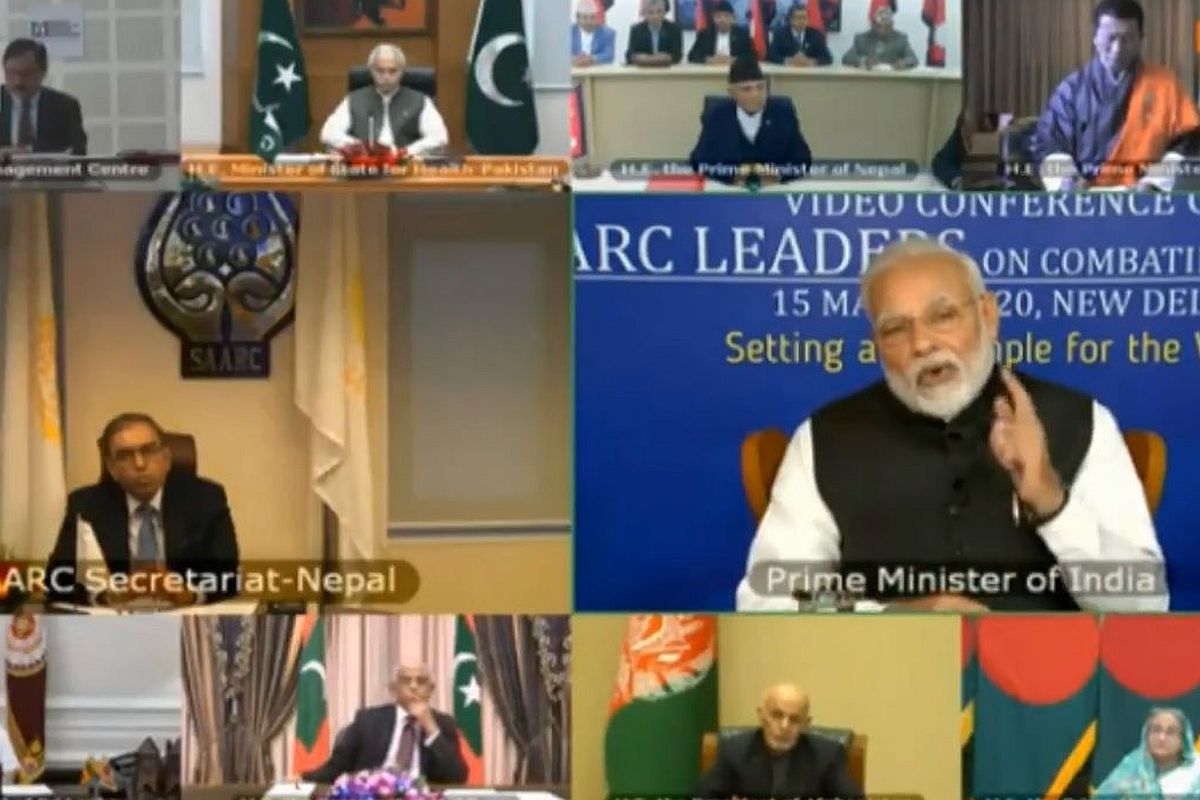Pakistan’s ANF arrests 10 suspects in drug smuggling operations
The Anti-Narcotics Force (ANF) of Pakistan arrested 10 individuals involved in drug smuggling in operations across the country, said a statement.
On Wednesday, Pakistan boycotted a video conference of trade officials of the SAARC countries to discuss ways to minimise the economic cost of the pandemic saying such initiatives could only be effective if spearheaded by the group’s secretariat instead of India.

Prime Minister Narendra Modi interacts with the leaders of SAARC nations on combating COVID-19 pandemic, via video conferencing. (File Photo: IANS)
Pakistan is aiming to score narrow political goals by attempting to bring India’s initiatives to collectively fight the coronavirus pandemic in the SAARC region under the formal umbrella of the grouping, government sources said on Thursday.
On Wednesday, Pakistan boycotted a video conference of trade officials of the SAARC countries to discuss ways to minimise the economic cost of the pandemic.
Islamabad said such initiatives could only be effective if spearheaded by the group’s secretariat instead of India.
Advertisement
Sources said Pakistan has been angling to bring COVID-19 related interactions made under Prime Minister Narendra Modi’s initiative under formal SAARC umbrella by involving the SAARC secretariat.
This is seen as an attempt to get free hand to block India’s initiatives and proposals by using the SAARC Charter provisions, Rules of Procedure etc. including application of principle of consensus for the drafting of agenda, outcome document, concurrence of all member states for each and everything in every step of the way.
India has described its engagements with SAARC members on COVID-19 related matters as being “stand-alone” and outside the “SAARC calendar of approved activities”.
The government sources have further said that keeping control of the activities that emerged from PM’s video conference of March 15 has helped India move much faster and without any hindrances.
They added that India regards the present activities as events under extraordinary COVID-19 circumstances focussed only on jointly dealing with the challenge in SAARC region in a result-oriented way, without being bound by any procedural formalities that could prove to be constraints.
The trade officials of the SAARC countries on Wednesday broadly agreed to identify new ways to “sustain and expand” the intra-regional trade to offset the huge economic cost of the coronavirus pandemic.
The officials also deliberated on creating a larger framework of trade facilitation and highlighted the need to enhance the quantum of intra-SAARC trade as the pandemic is likely to have a considerable impact on the region.
The deliberations took place as a follow up to an India-initiated video conference of SAARC leaders on March 15. Prime Minister Narendra Modi had suggested in the conference that the member nations of the bloc should come together to jointly fight the pandemic.
The South Asian Association for Regional Cooperation (SAARC) is a regional grouping comprising Afghanistan, Bangladesh, Bhutan, India, the Maldives, Nepal, Pakistan and Sri Lanka.
All the SAARC member nations are reeling under adverse social and economic impact of the coronavirus pandemic.
Meanwhile, at the video summit initiated by PM Modi, while all other countries were discussing humanitarian crisis of the coronavirus pandemic that has hit the world, Pakistan raked up the Kashmir issue.
The video-summit was significant because since 2016, SAARC, comprising eight countries of South Asia, had been mostly inactive.
Prime Minister Narendra Modi had refused to attend the 2016 summit which was to be held in Islamabad, following the Uri terror attack perpetrated by Pakistani terrorists. After Bangladesh, Afghanistan and Bhutan also withdrew from the meet, the summit had been called off.
In an unprecedented move in the diplomatic history of the world, India’s Prime Minister Narendra Modi proposed to hold a web-summit of SAARC countries today in view of the WHO advisory to avoid public gatherings. The proposal was welcomed and accepted by other members of the body — Afghanistan, Bangladesh, Bhutan, the Maldives, Nepal, Sri Lanka and Pakistan.
However, Prime Minister Imran Khan did not attend the summit and sent his special assistant for health, Zafar Mirza, as his representative who in turn raised the issue of Kashmir.
Government sources in New Delhi said Pakistan attempted to politicize a humanitarian issue by harping on Kashmir.
Advertisement